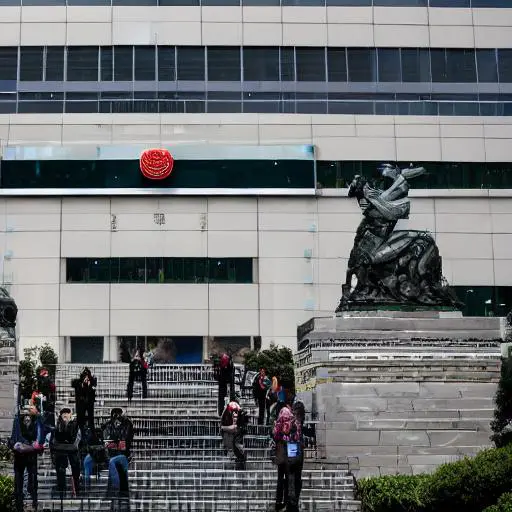The Biden administration expanded its campaign against China’s chip industry on Thursday by adding the Chinese memory chipmaker YMTC and 21 “major” Chinese players in the artificial intelligence chip sector to a trade blacklist.
YMTC, which has long been on the government’s radar, was added to the list due to concerns that it could divert American technology to previously blacklisted Chinese tech giants Huawei Technologies Co Ltd [RIC:RIC:HWT.UL] and Hikvision (002415.SZ). The move, detailed in the Federal Register, will prevent YMTC’s suppliers from shipping goods to it from the United States without a difficult-to-obtain license.
The United States government has effectively blocked access to technology produced anywhere in the world using U.S. machinery for the 21 Chinese AI chip companies that have been added to the trade blacklist, which also includes Cambricon Technologies Corp (688256.SS) and CETC. These companies will face a harsher penalty.
PXW Semiconductor Manufactory Co., a startup chip factory supported by the Shenzhen city government and run by a former Huawei executive, was another notable name.
According to Thea Kendler, assistant secretary of commerce for export administration, “U.S. national security interests require that we act decisively to deny access to advanced technologies” as the Chinese government works to remove barriers between its military and civilian sectors.
Requests for comment from YMTC, Cambricon, CETC, and PXW did not immediately elicit a response. After being separated from the government think tank China Academy of Sciences in 2016 and going public four years later, Cambricon’s shares fell 6% on Friday at market open.
The American government, according to the Chinese embassy in Washington, is engaging in “blatant economic coercion and bullying in the field of technology,” undermining regular business dealings between Chinese and American corporations and endangering the stability of global supply chains.
The legitimate rights and interests of Chinese businesses and institutions will be steadfastly protected by China.
The action builds upon broad export controls imposed on Beijing in October to halt Beijing’s technological and military advancements, including measures to restrict China’s access to American chipmaking tools and cut it off from specific chips made anywhere in the world with American machinery.
Additionally, it occurs as Congress works to complete legislation that would forbid the United States government from purchasing goods made with semiconductors from YMTC, Chinese memory chipmaker CXMT, or China’s top chip maker, SMIC.
The Shanghai Micro Electronics Equipment Group Co Ltd (SMEE), China’s sole lithography business, was among the nine Chinese entities that the Commerce Department purportedly targeted on Thursday for allegedly attempting to support China’s military modernization.
Tianjin Tiandi Weiye Technologies, a Chinese surveillance camera manufacturer, was added for allegedly participating in “China’s campaign of repression, mass arbitrary detention, and high-tech surveillance against Uyghurs.
A total of 35 Chinese entities, as well as YMTC’s Japan-based subsidiary, were added to the US trade blacklist, known as the entity list.
The announcements on Thursday were not all bad news for Beijing. Due to successful site visits, the Biden administration removed a subsidiary of Wuxi Biologics, a company that manufactures ingredients for AstraZeneca’s (AZN.L) COVID-19 vaccine, and 26 other Chinese entities from the so-called unverified list.
YMTC and SMEE, two of the Chinese companies removed from the unverified list, were added to the entity list.
Such a move was reportedly in the works, according to Reuters on Wednesday. Prior to a different division of the company being taken off the unverified list in October, Wuxi Biologics allowed American officials to visit the center earlier this year, according to a separate report from Reuters.
Companies are added to the unverified list if the US is unable to conduct on-site inspections to determine whether they can be trusted to receive sensitive US technology exports, which require approval from China’s commerce ministry.
U.S. suppliers are required to conduct more research before shipping to the targeted companies as a result of being added to the unverified list.
Commerce Department officials have attributed Beijing’s increased cooperation in site inspections to a US rule announced in October. If a government prevents US officials from conducting site checks at companies on the unverified list, Washington has 60 days to add them to the entity list.
Due to the United States inability to conduct site visits, the Commerce Department on Thursday added nine Russian entities to the entity list and removed them from the unverified list in accordance with the new policy.
Chuck Schumer, the top Senate Democrat, applauded the new sanctions against YMTC, which Reuters reported was being investigated for allegedly breaking U.S. export laws by providing chips to Huawei without a license.
The Biden Administration had to move quickly, he said in a statement, to prevent YMTC from gaining even an inch of a military or economic advantage. YMTC poses an immediate threat to their national security, he added.













